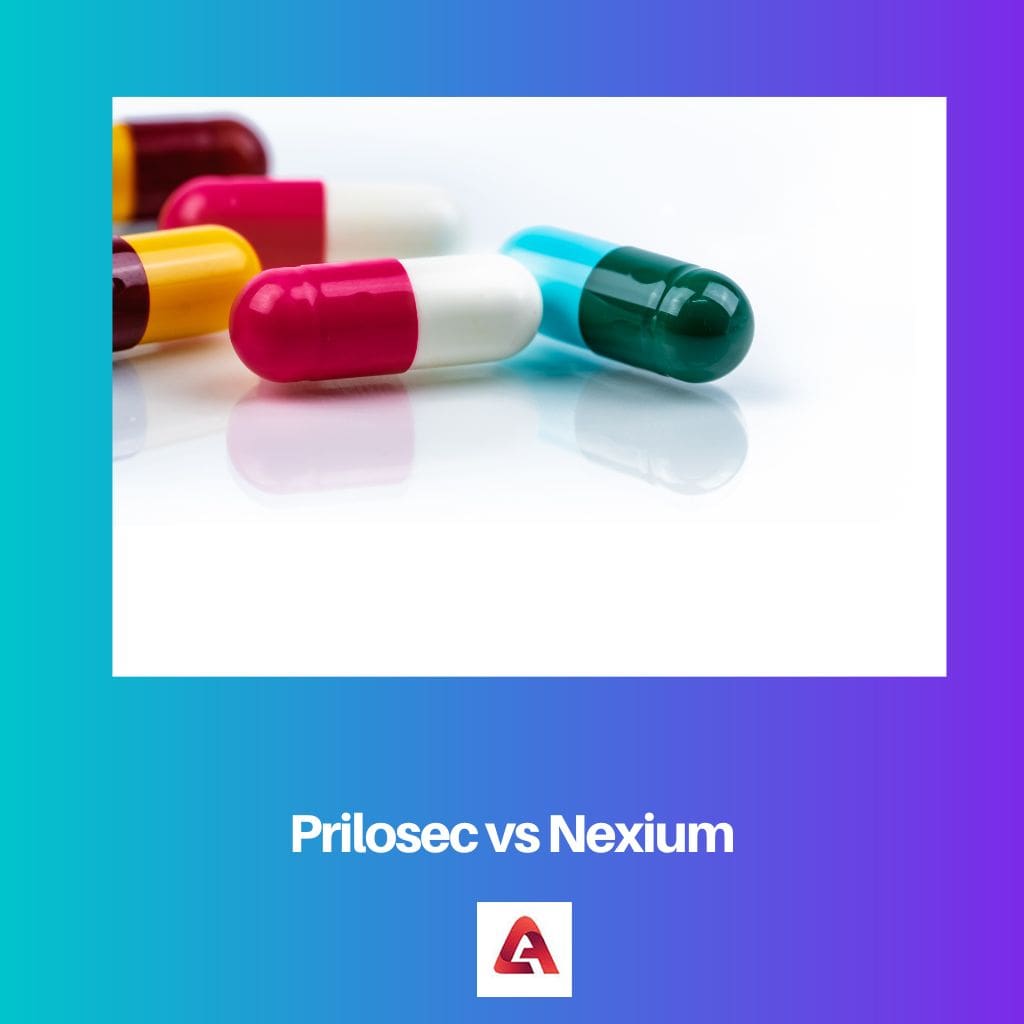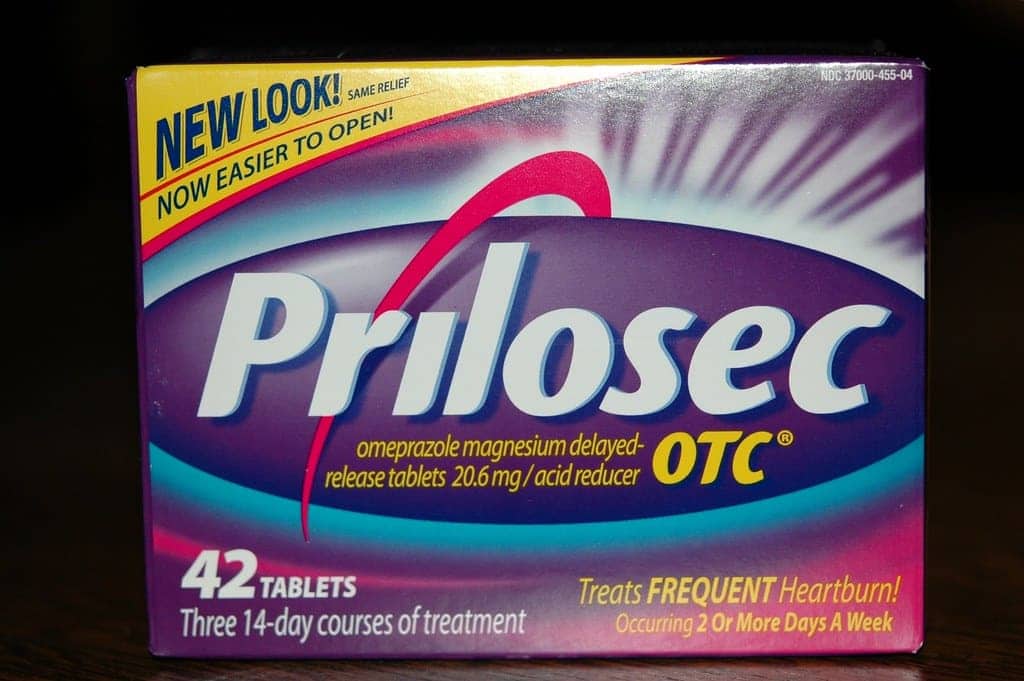Prilosec or omeprazole and Nexium or esomeprazole magnesium are proton pump inhibitors (PPIs) that are being used to cure gastric and duodenal ulceration, gastroesophageal reflux disease known as GERD, as well as Zollinger-Ellison disease.
Prilosec and Nexium are both accessible as generic medicines and over-the-counter medications or OTC.
Key Takeaways
- Prilosec contains omeprazole as the active ingredient, while Nexium contains esomeprazole, an enantiomer of omeprazole.
- Nexium may provide faster and more effective relief of acid reflux symptoms than Prilosec.
- Both Prilosec and Nexium belong to the proton pump inhibitor (PPI) class of medications and work by reducing stomach acid production.
Prilosec vs Nexium
Prilosec is a brand name for the generic drug omeprazole, which belongs to the class of medications known as proton pump inhibitors (PPIs). Nexium is a brand name for the drug esomeprazole, which works by reducing the amount of acid produced in the stomach to treat gastroesophageal reflux disease.

Prilosec is a prescribed and over-the-counter medication intended to address the effects of gastroesophageal reflux disease (GERD), gastric ulcers, as well as other disorders induced by too much gastric acid.
Prilosec can be used on its own or in combination with other drugs. Prilosec is a Proton Pump Inhibitor, which is a class of medication.
Nexium or esomeprazole magnesium is a proton pump blocker that reduces stomach acid production.
Nexium is a medication that is used to manage the effects of gastroesophageal reflux disease or GERD and other illnesses encompassing increased gastric acidity, such as Zollinger-Ellison disease.
It is also employed to help heal erosional esophagitis.
Comparison Table
| Parameters of Comparison | Prilosec | Nexium |
|---|---|---|
| Isomers | The isomer inside Prilosec is separated apart and digested much quicker and faster. | The isomer inside Nexium is separated apart and digested much slowly and gradually. |
| Results | Prilosec has a shorter reaction on your body and may potentially slow down the symptoms gradually. | Nexium has a longer impact on your body and may potentially alleviate the symptoms faster. |
| Cost | Prilosec is quite cheap in the market. | Nexium is comparatively much costlier. |
| Side effects | Prilosec is much less likely to cause certain side effects like nausea, headaches, vomiting, or diarrhea. | Nexium is much more likely to cause certain side effects like nausea, headaches, vomiting, or diarrhea. |
| Brand Name | Prilosec is more commonly known as Omeprazole in medical terms. | Nexium is more commonly known as Esomeprazole in medical terms. |
What is Prilosec?
Prilosec is a medication used to address specific gastric and oesophagal issues. It acts by reducing the quantity of acidity produced by your belly.
It alleviates problems such as indigestion, eating difficulties, as well as a chest infection.
This medicine aids in the healing of an acid injury to the gut as well as the oesophagus, the prevention of ulceration, as well as the prevention of oesophagal cancer.
Prilosec is a proton pump inhibitor, which is a type of medication. Over-the-counter Prilosec medications are utilized to cure regular indigestion if you are self-treating with this medicine.
These medications might not alleviate heartburn immediately since they may take 1 to 4 days to achieve full action. When using over-the-counter medications, fully read the packaging directions to ensure the medicine is appropriate.
Even if you’ve used the medication previously, read the components on the packaging. The supplier might have altered the components.
Furthermore, items with identical brand names may include distinct substances intended for various meanings. Using the incorrect product might do you injury.
Take this medicine orally as instructed, once a day before a meal. Your health condition and reaction to the medication determine the duration and amount of medication.
Weight is used to determine the dose in children. Do not raise your dose or use this medication more frequently than prescribed.

What is Nexium?
Nexium is a medication that is used to treat specific abdomen and oesophagal problems. It works by reducing the quantity of acid produced by your stomach.
It alleviates issues like gastritis, eating difficulties, and a chronic cough.
This medicine aids in the healing of acid damage to the stomach and oesophagus, the prevention of ulcers, and the prevention of oesophagal cancer.
Prescribed Nexium is available as a delayed-release pill to swallow or open, mix with water, and administer via a feeding tube, as well as packs of delayed-release grains for dispersion to swallow or administer via a feeding tube.
Nexium is available without a prescription (over-the-counter) as a delayed-release pill and tablet to consume by mouth.
Nexium is a proton pump inhibitor, which is a type of medication (PPIs). Over-the-counter Nexium tablets are used to relieve recurrent indigestion if you are self-treating with this drug.
Nexium is normally given once a day, at least 1 hour before a meal. Prescribed Nexium is given twice a day to address some diseases in which the stomach produces too much acidity.
In addition, it is used in conjunction with other drugs to treat and prevent the recurrence of stomach ulcers caused by a specific kind of bacterium (H. pylori) in adults.
Prescription Nexium is also used to treat adult Zollinger-Ellison syndrome, a disorder in which the stomach generates too much acid.
Nonprescription Nexium is used to cure individuals with regular heartburn (heartburn that happens at least twice a week).

Main Differences Between Prilosec and Nexium
- Nexium is an esomeprazole trade title, and Prilosec is an omeprazole trade identifier.
- Nexium has just one isomer of omeprazole, whereas Prilosec includes two.
- There is some indication that Nexium is more successful at controlling acid, lasts longer, and works quicker than Prilosec; however, several studies have failed to identify a distinction between the two medications, and there are no significant distinctions between PPIs when utilized to cure GERD.
- Nexium is normally more costly than Prilosec, but generic versions are comparable in price.
- Although PPI adverse effects (such as diarrhoea, sickness, puking, or migraine) are infrequent, Nexium may be more prone to induce them than Prilosec.




